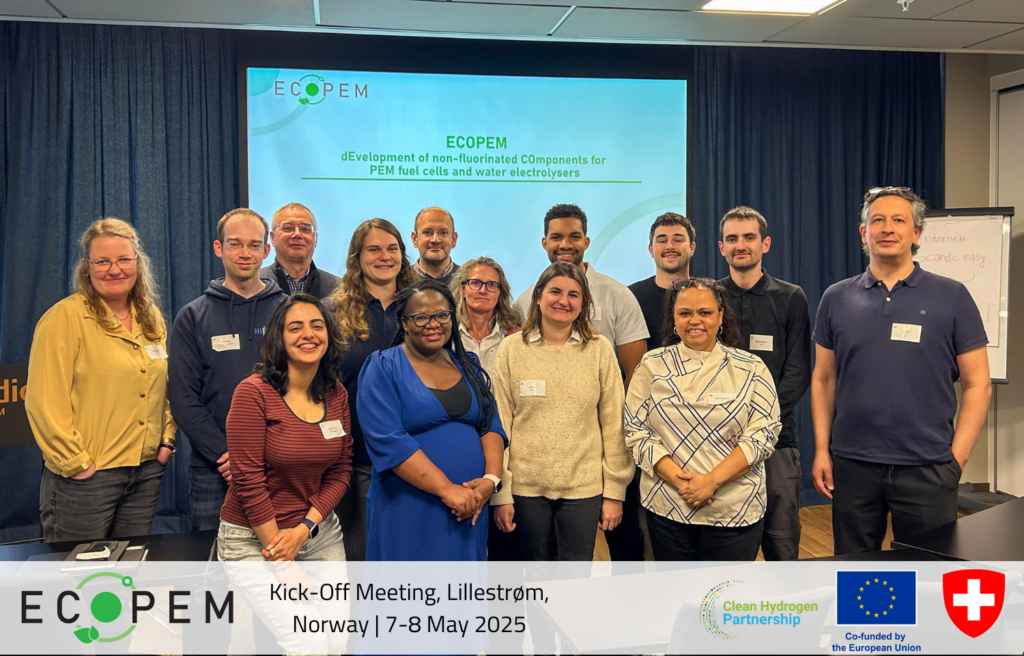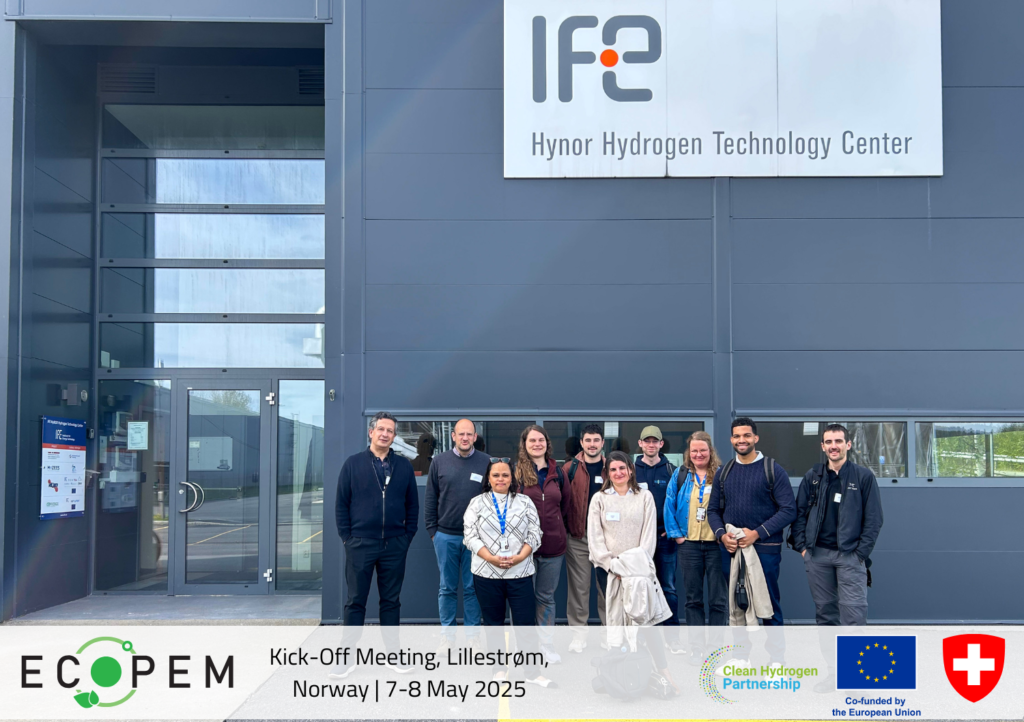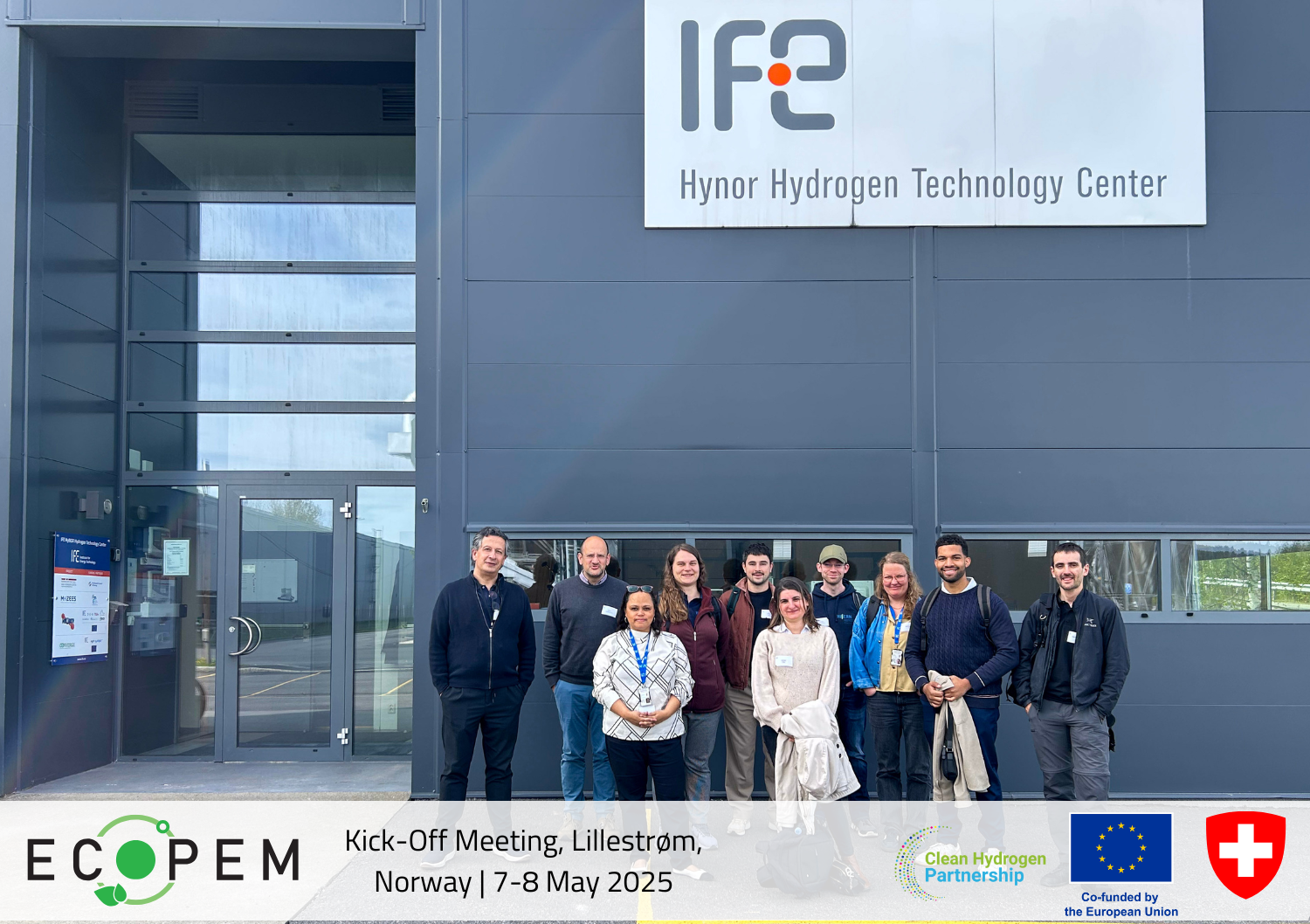Lillestrøm, 12 May 2025
The Horizon Europe project ECOPEM (dEvelopment of non-fluorinated COmponents for PEM fuel cells and water electrolysers) officially kicked off last week in Lillestrøm, Norway. Coordinated by the Institute for Energy Technology (IFE), the project brings together leading research institutes and industrial partners from across Europe to develop safer, more efficient, and more sustainable alternatives to current materials used in hydrogen technologies.
ECOPEM Concept
Proton Exchange Membrane (PEM) fuel cells and water electrolysers are vital technologies for Europe’s green transition and hydrogen future. However, nearly all commercial PEM systems today rely on perfluorinated sulfonic acid (PFSA)-based materials, which are expensive to produce and pose serious environmental and health concerns due to the release of toxic fluorine compounds during their lifecycle.
ECOPEM addresses this challenge by developing non-fluorinated, hydrocarbon-based membranes, reinforcements, and ionomers. These new materials aim to match or exceed the performance and durability of current PFSA-based systems while offering significant advantages in cost, recyclability, and environmental safety.
Over the course of the project, the ECOPEM will:
- Develop next-generation non-fluorinated materials for use in PEM fuel cells and electrolysers, including membranes and ionomers designed for high chemical and mechanical stability
- Demonstrate high-performing and durable PEMFC and PEMWE cells that meet or exceed the Hydrogen Europe’s 2030 targets, including higher current densities, reduced degradation, and lower hydrogen crossover
- Apply life cycle assessment (LCA) and techno-economic analysis (TEA) to ensure that all developed materials and designs are not only technically sound, but also economically viable and environmentally sustainable
“There’s a growing urgency to replace PFSA materials—not only because of regulatory pressure, but also because of their cost,” said Thulile Khoza, ECOPEM project coordinator at IFE. “With ECOPEM, we’re taking a safe-by-design approach to develop new, high-performing alternatives for fuel cells and electrolysers.”
Supporting Europe’s hydrogen goals
As part of the project’s validation activities, ECOPEM will produce and test advanced membrane electrode assemblies (MEAs), including a 10-cell PEMFC short stack for heavy-duty vehicle applications and PEMWE single cells for renewable hydrogen production.
Operating fuel cells at intermediate temperatures (100–120 °C) using hydrocarbon membranes will also improve efficiency and simplify system cooling—an important step toward commercializing fuel cell solutions in the transport sector.
ECOPEM directly supports the EU’s goals to decarbonize transport and increase hydrogen production under initiatives such as REPowerEU and the European Green Deal, while responding to regulatory pressure to phase out hazardous fluorinated chemicals in industrial applications.
ECOPEM Partners:

- Institute for Energy Technology (IFE)
- Forschungszentrum Jülich (FZJ)
- Helmholtz-Zentrum Hereon
- University of Birmingham
- Symbio
- École Polytechnique Fédérale de Lausanne (EPFL)
- Haute École Spécialisée de la Suisse Occidentale (HES-SO).


This project has received funding from the European Union’s Horizon Europe research and innovation program under grant agreement No 101192366 and the Swiss State Secretariat for Education, Research and Innovation (SERI). The project is supported by the Clean Hydrogen Partnership and its members.
For media enquiries or more information, please contact project Coordinator Thulile Patricia Khoza: thulile.khoza@ife.no or Ragnhild Hancke: Ragnhild.Hancke@ife.no
Related news
-

5. January 2026
From Idea to Industry: The Innovation Journey of IFE and Oliasoft
In the world of innovation, the most significant changes often begin with a simple…
-

25. November 2025
The WellFate Project Releases New Video on the Challenges of Old Offshore Wells
The Reservoir Department at IFE has published a new video that highlights an important…


